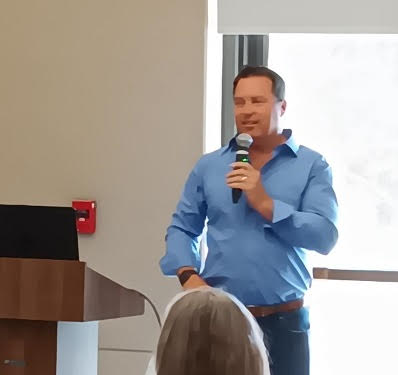By TR Robertson
Monday morning, at the Encinitas Senior Center, was the scene for a very informative presentation, concerning Elder Fraud, by a member of the Federal Bureau of Investigation in conjunction with the San Diego Seniors Community Foundation and The Country Friends, funded by Wells Fargo Foundation. The seminar was also held in collaboration with the FBI Citizens Academy Alumni Association with the purpose to educate and inform seniors and their friends and families about frauds and scams affecting them and others in the community.
The presentations began with a welcome and an introduction by Janean Stripe, President of The Country Friends, a group celebrating their 70th anniversary. This organization has raised over $15 million dollars over the years to assist organizations in the area with a variety of projects and issues. Janean introduced Kristoffer Kelly, Vice President of the San Diego Seniors Community Foundation, who also thank all of those in attendance for wanting to stay informed about scams and frauds that affects thousands of people. The SDSCF assists seniors with their “financial well-being and physical mental health”.
Kristoffer introduced Laura MacKinnon Chapman, Senior Social Impact & Sustainability Specialist, with Wells Fargo Bank. Laura pointed out how important staying informed about these frauds and scams is as California is one of three of the top states in the United States for citizens affected by fraudulent scams. The other two top states are Florida and Texas. She also said only 5% of these illegal frauds and scams are ever reported. She said she had dealt with fraudulent Pay Pal charges. Laura also said to not trust caller ID notifications as these lead many times to scams. She also reminded the group to not share personal information, especially Social Security Numbers and Passwords. Many of the presenters reminded those in attendance never to mail or send money to groups or people they do not personally know. Next speaking was Maria Joyce, Treasurer of the FBI San Diego Citizens Academy Alumni Association. This award-winning group has helped many seniors become more educated about fraud and scams. Maria introduced the main speaker and presenter for today’s seminar, Apollo Ayala, Intelligence Analyst for the Federal Bureau of Investigation.

Mr. Ayala works out of the Carlsbad Office for the FBI. He began the power point presentation with a picture of an article, recently running in the New York Times and seen on Yahoo and other social news media, about a gentleman that lost $750,000 from his savings account when he fell victim to a scam of a company who convinced him they were trying to stop scammers and his financial assistance was needed to help them stop these scammers. He defined Elder Fraud victims as anyone over 60 years old. Mr. Ayala listed some of the reasons this part of society seems to be the worst of the victims of fraud and scams. This includes this group being considered a vulnerable part of the population. He said they are, for the most part, less experienced with technology, making it easier to fall for fast-talking scammers to work their way into getting whatever they needed from their financial accounts. He also said they are less likely to report these scams, whether out of embarrassment or lack of knowledge about who to report the crime to. Ayala also said this 60+ group is generally over trusting, what is considered a good trait, but not so in the world of crime.
“In 2023, the Internet Crime Complaint Center (IC3) received over 880,000 complaints with potential losses exceeding $12.5 billion. For those over the age of 60, they were $3.4 billion of the loss. Nationwide, Tech Support Fraud was the number one crime type impacting seniors.” He said California was #1 with 11,622 victims.

Intelligence Analyst Ayala next discussed three of the most prevalent Frauds and Scams that affect seniors. The first was Tech Support Scams. This can occur on cell phones or home computers. Many times, it starts with pop-up messages from supposed Tech Support asking the individual to call a phone number listed on the pop-up. Ayala said the Ivory Coast of Africa seems to be the major location for this operation. The group was reminded to never click on these links and never call the phone number listed. He said emails or phone calls from groups saying they are with the IRS, FBI or some other governmental agency asking for personal information is also another scam that is surfacing.
The Grandparent Scam is a popular scam found in the San Diego area. Ayala said many of these generate from the Caribbean area. Basically, these involve a phone call or email supposedly from a child or relative saying they find themselves in trouble and in need of money to get out of their predicament. One woman in San Diego recently lost $1.3 million in this type of scam. Many times, people that fall for these are asked to deliver money to a drop off spot or at times a “money mule” might appear to pick money up from the individual being scammed. He said, “You don’t have to give anyone any money for anything that is the least bit suspicious.”

The next scam discussed was the Romance Scam. Ayala said this generally originates from West Africa. These scammers pose as interested romantic partners or friends, usually on social media or dating websites. They usually never post their photo. Ayala said one woman lost $170,000 to a scammer seemingly stuck in Saudia Arabia. The lesson from these is to stay away from these web sites, especially if the person being contacted comes up with some elaborate story about needing a large amount of money to be released or find their way home. He said these criminals, regardless of the type of scam, will seek a variety of ways to get into your accounts. Never wire, mail, UPS or FedEx cash. “Remember once the money’s gone, it’s gone”. Criminals will create a sense of urgency and even try and convince you to not contact family or friends. Definitely don’t provide any personal information.
During a question-and-answer session it was pointed out that scammers are spoofing people about being from the FBI, Sheriff’s Department, IRS and other agencies. We were told the safest way to use credit cards is to tap them, don’t insert or swipe them. He said a recent scam is coming from China and involves texting people and involves a crypto currency scam. We were also told it is best to not click on or answer your phone, even if you have caller ID especially if you don’t recognize the phone number, let it go to voice mail. Many scam calls will not leave a message, if they are friends and know you, they will leave a phone message. When asked if any of the victims get any of their money back, Ayala said it is probably about a 50-50 chance and the investigations generally take a long time.
These are a few of the other Common Elder Fraud Scams:
Sweepstakes/Lottery/Inheritance Scam
Investment Scam
Charity Scams
Utility/Gift Card Scams
Family/Care-Giver Scams
TV/Radio Scams
Home Repair Scams
Non-Delivery of Product Scams
For information about any of these scams or frauds go to www.fbi.gov/elderfraud or www.fbisdcaaa.org/elderfraud . For Internet Crime Complaints go to www.ic3.gov. The phone number for the FBI Office in Carlsbad is 760-929-0811, for FBI San Diego call 858-320-1800. The National Elder Fraud Hotline is 833-372-8311.
Remember – Be diligent, Be cautious, Don’t be impulsive and Always Protect your Personal Information.


















